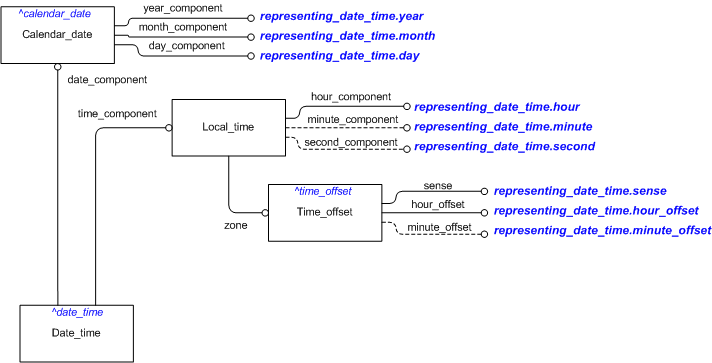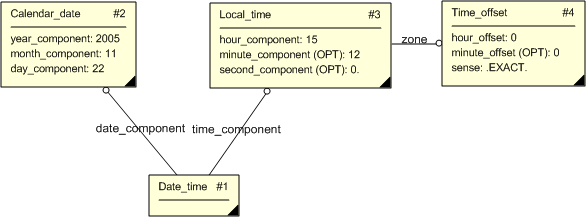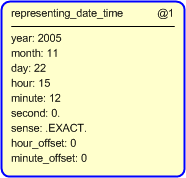| Template:— representing_date_time (rep_date_time) |
Date: 2008/03/04 23:11:32
Revision: 1.17
|
This section specifies the template representing_date_time.
NOTE
An explanation of a template and the associated instantiation path is
provided in the
Template overview
section.
This template describes how to represent a
Date_time.
The EXPRESS-G diagram in
Figure
1
shows the templates and EXPRESS entities that are required
to represent the template
"representing_date_time".
The text highlighted in blue shows the template parameters.
Figure 1 — An EXPRESS-G representation of the Information model for representing_date_time
The graphic for the template to be used in other EXPRESS-G diagrams
is shown in Figure
2
below.
Figure 2 —
The graphical representation of representing_date_time template
The following input parameters are defined for this template:
Calendar_date year_component of the date and time.
Calendar_date month_component of the date and time.
Calendar_date day_component of the date and time.
Local_time hour_component of the date and time.
Local_time minute_component of the date and time.
This parameter is optional. If not given, it will remain unset.
Local_time second_component of the date and time.
This parameter is optional. If not given, it will remain unset.
The direction of the offset. Type (Enumeration) values are: 'ahead', 'exact' or 'behind'.
The number of hours by which a time is offset from Coordinated Universal Time.
The number of minutes by which a time is offset from Coordinated Universal Time.
The value of this attribute need not be specified.
This parameter is optional. If not given, it will remain unset.
The following reference parameters are defined for this template:
Allow the
Date_time
entity instantiated in this path to be referenced when this template is used.
Note: The
Date_time
entity can be referenced in a template path by:
%^target = $representing_date_time.date_time%
where
target
is the parameter to which the
Date_time
is bound.
Allow the
Time_offset
entity instantiated in this path to be referenced when this template is used.
Note: The
Time_offset
entity can be referenced in a template path by:
%^target = $representing_date_time.time_offset%
where
target
is the parameter to which the
Time_offset
is bound.
Allow the
Calendar_date
entity instantiated in this path to be referenced when this template is used.
Note: The
Calendar_date
entity can be referenced in a template path by:
%^target = $representing_date_time.calendar_date%
where
target
is the parameter to which the
Calendar_date
is bound.
The following parameter combinations specify a uniqueness constraint:
Unique constraint: Unique calendar date
There shall be at most one instance of the
entity
(
Calendar_date)
within the data set uniquely identified
by a combination of the following parameters on this
template (representing_date_time) namely:
year,
month,
day.
The
instance is
referenced by the following template parameter:
calendar_date.
Unique constraint: Unique time offset
There shall be at most one instance of the
entity
(
Time_offset)
within the data set uniquely identified
by a combination of the following parameters on this
template (representing_date_time) namely:
hour_offset,
minute_offset,
sense.
The
instance is
referenced by the following template parameter:
time_offset.
The instantiation path shown below specifies the entities that are to be
instantiated by the template.
The instance diagram in Figure
3
shows an example of the EXPRESS entities and templates that are instantiated by the template:
/representing_date_time(year='2005', month='11', day='22', hour='15', minute='12', second='00', sense='exact', hour_offset='0', minute_offset='0')/
(an illustration of the consolidated representing_date_time template is shown in
Figure
4 below.)
Figure 3 — Entities instantiated by representing_date_time template
The instance diagram in
Figure
4
shows the graphic symbol for the template that is to be
used in other instance diagrams. The example template is:
/representing_date_time(year='2005', month='11', day='22', hour='15', minute='12', second='00', sense='exact', hour_offset='0', minute_offset='0')/
Figure 4 — Instantiation of representing_date_time template
Characterizations
No common characterizations of the template
representing_date_time
have been identified. However, the ISO 10303-239 EXPRESS model
may enable other assignments to the entities instantiated by the template.




